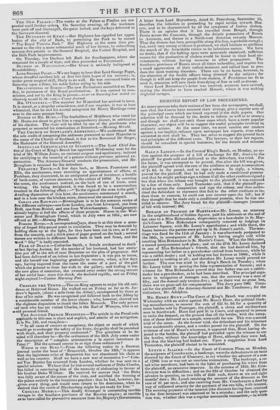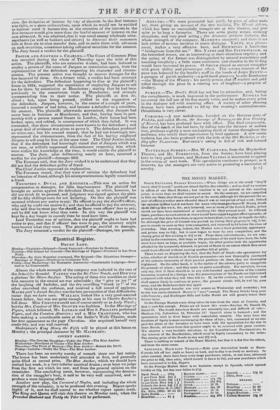DIGESTED REPORT OF LAW PROCEEDINGS.
As many persons take their notions of law from the newspapers, we shall, now that the Courts have resumed their sittings, give a regular note of the principal cases which are Icnuld reported in the daily papers. Our selection will be directed by the desire to inform as well as to amuse; and though we shall not omit those cases which have a more popular character, our object will be to suggest the useful principles involved in ordinary actions. At the same time, we must caution our readers against a too implicit reliance upon newspaper law reports, even when corrected as ours shall be. They but serve to suggest the general facts and principles of the different cases. The lawyers, or their law reports, should be consulted in special instances, for the details and minuter distinctions.
GALE V. Lateur.—In the Court of King's Bench, on Monday, an ac- tion against the acceptor of a bill of exchange for 82/., drawn by the plaintiff for goods sold and delivered to the defendant, was tried. For the latter, it was attempted to be proved, that after the bill was given, the plaintiff agreed with the rest of the creditors to accept a composition of 7s. 6d. in the pound, and to sign a release. In reply, a witnes,. proved for the plaintiff, that lie had only made a conditional promise and that he might perhaps sign a release if all the other creditors signed ; but that when the release was brought to the plaintiff, it was executed by a few of them only. Lord Tenterden said, that if the plaintiff pro- mised to accept the composition and sig*t. the release, and thus autho- rized the defendant to represent that fact to the other creditors to in- duce them to execute, he could not now recover upon the bill; but if they thought that he made only a conditional promise, then he was en- titled to recover. The Jury found for the plaintiff—damages (amount of bill with interest) 864.
: owl
BREACH or PROMISE or Maanlion.—Mr. Loney, an attorney . in the neighbourhood of Golden Square, paid his addresses at theend of last year to a Miss Birkenshaw, shopwoman to a lace-dealer in St. Mar- tin's.Court. Miss Birkenshaw subsequently removed to lodgings ha Leicester Square, with Mr. Loney's approbation ; and while there, the banns between the parties were put up in St. James's parish. The mar- riage was fixed for the 11th of January : it was afterwards postponed to the 16th, in consequence of Mr. Loney's having caught cold while courting Miss Birkenshaw in St. Martin's Court. When the 16th came, a second postponement took place ; and on the 27th Mr. Loney declared to one of Miss Birkenshaw's friends, that she had deceived him by representing her father as a pawnbroker retired from business, while he was a rabbit-dealer; and in holding out her fortune as 16001., while it - amounted to nothing at all ; and therefore Mr. Loney would proceed no, farther. The case was tried in the King's Bench on Tuesday; when Mr. Loney failed in proving the false representation of fortune; and a witness for Miss Birkenshaw proved that her father was not a rabbit. dealer but a pawnbroker, as he had been described. The principal argu- ment in mitigation of damages was, that the attorney was a man of fifty, and the damsel only twenty-five ; and as there was no great loss, there was no great call for compensation. The Jury gave 100/. Coun- sel for the plaintiff, the Attorney-General and Mr. Tomlinson ; for the defendant, Mr. Adolphus.
Mn. HENRY RUNT.—The Court of King's Bench was occupied on Wednesday with an action against Mr. Henry Hunt, the political black- ing-manufacturer, to recover the sum of 62/. 6s. 8d. for a quantity of stone bottles sold by Passenger, the plaintiff, a china and earthenware man in Southwark. Hunt had paid 5/. in Court, and appeared in person to resist the demand, on the ground that all the bottles, with the excep- tion of those delivered as a sample, were unfit for use. This was a second trial of the cause. At the former trial, the defendant and his witnesses were accidentally absent, and a verdict passed for the plaintiff. On the evidence of one of Hunt's witnesses, it appeared that, Hunt having ob- jected to the bottles, the plaintiff had prevailed upon the witness to use the bottles, without the knowledge of Hunt, although they were bad, and that the blacking had leaked out. Upon a suggestion from Lord Tenterdeu, the plaintiff elected to be nonsuited.
LYNCH v. IsaactrE.—In the Court of Common Pleas, on Monday, the assignees of Crosthwayte, a bankrupt, were the defendants in an issue directed by the Court of Chancery, to try whether the advance of a sum of 17001. was or was not an usurious transaction. The bankrupt, a re- tail wine merchant, had been in the habit of purchasing his wines from the plaintiff, an extensive importer. In the autumn of 1825, Mr. Cros- thwayte was in difficulties; and on the 22d of October he obtained the advance in question, on two bills of 8501. each, drawn at six and eight months' date ; Mr. Lynch retaining the amount of the discount at the rate of Si. per cent., and also receiving from Mr. Crosthwayte a deed by way of collateral security for the payment of the two bills, with interest. The securing payment of the interest (the discount having been retained in the first instance) was admitted to be a mistake; and the only ques- tion was, whether this was a regular mercantile transaction,— in which
case, the deduction of interest by way of discount in the first instance was right, or a mere ordinaryloan, upon which he would not be entitled to interest until it became due, as the retention of the intereat in the first instance would give more than the lawful amount of interest on the sum advanced. It was admitted,that it was usual among wholesale wine. merchants (as well as bankers and others) to discount their customers bills at from six to nine months' date, and to assist them with advances on such securities, sometimes taking collateral securities for the amount. The Jury found a verdict for the plaintiff.
FOSTER AND ANOTHER V. CHARLES.—The Court of Common Pleas was occupied during the whole of Thursday upon the trial of this
action. The plaintiffs, who are extensive dealers, had been induced to employ a person of the name of Jacques as commission-agent, from the representation of the defendant respecting his character and circum- stances. The present action was brought to recover damages for the loss incurred by them. On a former trial, a verdict had been returned for the defendant. The defendant happening to dine at the plaintiff's house in l82.4, suggested the expediency of employing Jacques to sell tea for them by commission at Manchester stating that he had been previously in the commission trade at Manchester, and strongly recommending him to their notice. The plaintiffs at first de- clined ; but, upon being pressed, yielded to the suggestion of the defendant. Jacques, however, in the course of a couple of years, incurred a number of bad debts, and became a defaulter to a considera- ble amount. The plaintiffs afterwards ascertained, that Jacques had never been in business at Manchester, and that, having been in part- nership with a person named Stuart in London, their house had been broken open, and robbed, in consequence of which they failed. It was contended, that these circumstances were known to the defendant ; and a great deal of evidence was given to prove it. The defendant produced no witnesses; but his counsel argued, that he had not knowingly mis- represented the circumstances from the fact of his haring employed Jacques to sell soap for him at the same time. The Chief Justice stated, that if the defendant had knowingly stated that of Jacques which was not true, or wilfully suppressed circumstances respecting him which were within his knowledge at the time, it would entitle the plaintiff to recover. The Jury, after deliberating nearly an hour, returned a verdict for the plaintiff—damages 803/, The Foreman said, that the Jury wished it to be understood that they -did not find the defendant guilty Of fraud.
The Chief Justice requested an explanation. The Foreman stated, that they were of opinion the defendant had no intention of fraud, although his misrepresentations legally constituted a fraud.
THOMPSON V. DUVAL AND ANOTHER —This was an action for compensation in damages, for 'die imprisonment. The plaintiff had brought an action against the defendant Duval, in which, however, he did not think fit to proceed, and judgment was signed against the plain tiff for fifty shillings costs for not declaring. On this the plaintiff was arrested Without any notice to pay." He'offered to pay the sheriff's Officer, who said he could not receive it ; and then he offered to pay the attorney, who said that lie-must jay the &Elf% as Mere- wereofficers' fees to pay, and he did not know what they were. In this way the plaintiff was kept for-a day longer in custody than he need have been.
Lord Tenterden was of opinion, that the plaintiff ought to have had notice to pay, and that if officer? fees were to pay, the attorney might have known what they were. The plaintiff was entitled to damages. The Jury returned a verdict for the plaintiff—Damages, ten pounds.



























 Previous page
Previous page